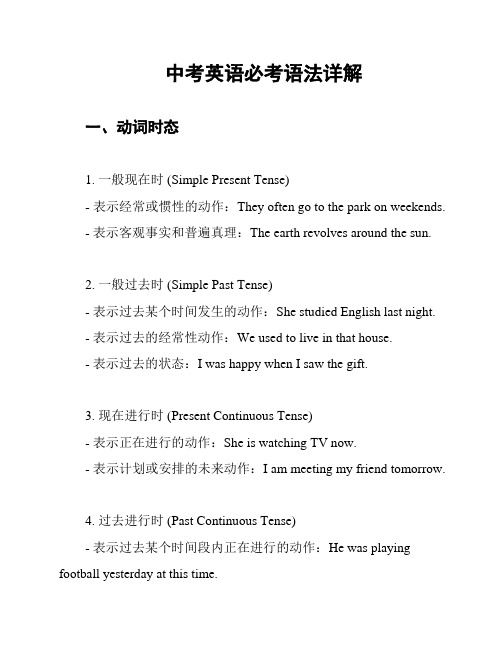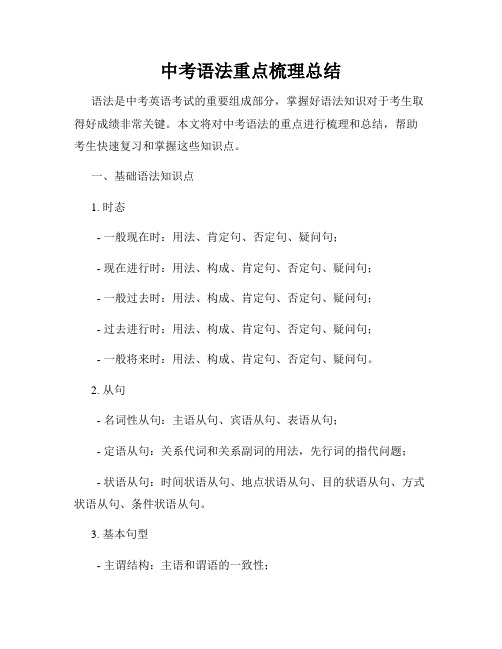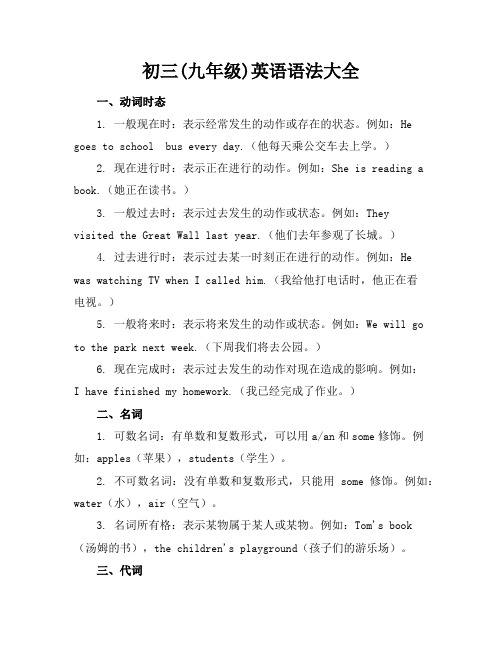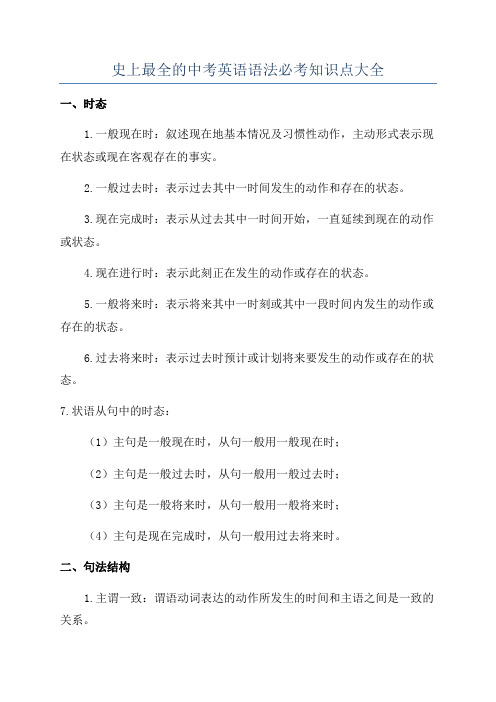中考英语语法笔记整理大全
初三英语笔记完整版

初三英语笔记完整版一、词汇篇1. 名词(1)可数名词:表示可以一个一个数清楚的名词,如:book、pen、student等。
(2)不可数名词:表示无法一个一个数清楚的名词,如:water、air、news等。
(3)名词复数:大部分名词在词尾加s或es变为复数形式,如:books、pens、students等。
2. 动词(1)动词时态:表示动作发生的时间,如:一般现在时、一般过去时、一般将来时等。
(2)动词短语:由动词和其他词组合而成的固定搭配,如:look after、take care of、get up等。
3. 形容词(1)形容词比较级:表示两者之间的比较,如:taller、thinner、richer等。
4. 副词(1)时间副词:表示动作发生的时间,如:now、then、always 等。
(2)地点副词:表示动作发生的地点,如:here、there、everywhere等。
5. 介词(1)表示时间:at、on、in等。
(2)表示地点:in、on、under等。
(3)表示方向:to、from、into等。
二、句型篇1. 简单句(1)陈述句:表示陈述事实,如:I like English.(2)疑问句:表示提问,如:Do you like English?(3)感叹句:表示强烈的感情,如:What a beautiful day it is!2. 并列句(1)并列连词:and、but、or等。
(2)并列句结构:两个简单句通过并列连词连接而成,如:I like English, but I don't like math.3. 复合句(1)主从句:由主句和从句构成,如:If it rains, we will stay at home.(2)从句引导词:that、who、which等。
三、语法篇1. 动词时态(1)一般现在时:表示经常发生的动作或状态,如:I go to school every day.(2)一般过去时:表示过去发生的动作或状态,如:I went to the park yesterday.(3)一般将来时:表示将来发生的动作或状态,如:I will go to Beijing next month.2. 句子结构(1)主谓宾结构:如:I love you.(2)主谓表结构:如:The flower is beautiful.(3)主谓双宾结构:如:My mother bought me a new book.3. 名词性从句(1)主语从句:如:What he said is right.(3)表语从句:如:The problem is who can help us.四、阅读理解篇1. 阅读技巧(1)快速浏览:先快速阅读全文,了解文章大意。
中考英语必考语法详解

中考英语必考语法详解一、动词时态1. 一般现在时 (Simple Present Tense)- 表示经常或惯性的动作:They often go to the park on weekends.- 表示客观事实和普遍真理:The earth revolves around the sun.2. 一般过去时 (Simple Past Tense)- 表示过去某个时间发生的动作:She studied English last night.- 表示过去的经常性动作:We used to live in that house.- 表示过去的状态:I was happy when I saw the gift.3. 现在进行时 (Present Continuous Tense)- 表示正在进行的动作:She is watching TV now.- 表示计划或安排的未来动作:I am meeting my friend tomorrow.4. 过去进行时 (Past Continuous Tense)- 表示过去某个时间段内正在进行的动作:He was playing football yesterday at this time.5. 现在完成时 (Present Perfect Tense)- 表示过去发生的与现在有联系的动作或状态:He has already finished his homework.6. 过去完成时 (Past Perfect Tense)- 表示过去某个时间点之前已经发生的动作或状态:She had already left when I arrived.7. 将来时 (Future Tense)- 表示将来要发生的动作或存在的状态:I will go to Beijing next week.二、被动语态1. 被动语态的构成:be + 过去分词- 主动语态:Tom eats an apple.- 被动语态:An apple is eaten by Tom.2. 被动语态的使用:- 强调动作的承受者:The book is written by a famous author.- 不知道或没有必要知道动作的执行者:The door was broken yesterday.三、情态动词1. can / could- 表示能力或许可:I can swim very well.- 表示请求或建议:Could you open the window, please?2. may / might- 表示允许或可能:You may go home now.3. must- 表示必须或肯定:She must finish her assignment by tomorrow.4. shall / should- 表示将要或应该:We should keep the classroom clean.四、倒装句1. 把助动词或情态动词提前,主语放在动词之后:- Never have I seen such a beautiful sunset.- Only after he left did I realize my mistake.2. 用于表示地点、方向、时间等状语提前:- At the top of the mountain stands a little cottage.- In front of the house is a beautiful garden.五、定语从句1. 定语从句用来修饰一个名词或代词,用以给出更多的信息。
中考语法重点梳理总结

中考语法重点梳理总结语法是中考英语考试的重要组成部分,掌握好语法知识对于考生取得好成绩非常关键。
本文将对中考语法的重点进行梳理和总结,帮助考生快速复习和掌握这些知识点。
一、基础语法知识点1. 时态- 一般现在时:用法、肯定句、否定句、疑问句;- 现在进行时:用法、构成、肯定句、否定句、疑问句;- 一般过去时:用法、构成、肯定句、否定句、疑问句;- 过去进行时:用法、构成、肯定句、否定句、疑问句;- 一般将来时:用法、构成、肯定句、否定句、疑问句。
2. 从句- 名词性从句:主语从句、宾语从句、表语从句;- 定语从句:关系代词和关系副词的用法,先行词的指代问题;- 状语从句:时间状语从句、地点状语从句、目的状语从句、方式状语从句、条件状语从句。
3. 基本句型- 主谓结构:主语和谓语的一致性;- 主谓宾结构:动宾搭配、及物动词和不及物动词; - 主系表结构:系动词的用法、表语的形式。
二、常见错误类型及纠正方法1. 词性错误- 形容词和副词的用法区别;- 名词和动词的转化。
2. 时态错误- 部分考生容易混淆不同时态的用法;- 注意句子的上下文语境,选择正确的时态。
3. 代词错误- 指代不明确,造成语义模糊;- 注意先行词和代词在语法和逻辑上的一致性。
4. 介词错误- 介词搭配的固定搭配用法;- 注意特殊动词和介词的搭配。
三、复合句的连接词1. 并列连接词- and, but, or, so等的用法和区别;- 注意使用上的逻辑连贯和前后句之间的平衡。
2. 引导性连接词- because, if, when, while等的用法;- 注意从句与主句之间的逻辑关系。
3. 状语连接词- before, after, since等的用法;- 理解并正确运用时间、地点和条件等状语从句。
四、易混淆的语法知识点1. 动词时态和语态的区别;2. 定语从句和状语从句的区别;3. 直接引语和间接引语的句式转换。
五、巩固方法与技巧1. 多做语法练习题,掌握各类语法知识的运用;2. 利用语法书籍和教辅材料进行针对性的学习;3. 多听、多读、多写,培养语感和理解能力。
初三(九年级)英语语法大全

初三(九年级)英语语法大全一、动词时态1. 一般现在时:表示经常发生的动作或存在的状态。
例如:He goes to school bus every day.(他每天乘公交车去上学。
)2. 现在进行时:表示正在进行的动作。
例如:She is reading a book.(她正在读书。
)3. 一般过去时:表示过去发生的动作或状态。
例如:Theyvisited the Great Wall last year.(他们去年参观了长城。
)4. 过去进行时:表示过去某一时刻正在进行的动作。
例如:He was watching TV when I called him.(我给他打电话时,他正在看电视。
)5. 一般将来时:表示将来发生的动作或状态。
例如:We will go to the park next week.(下周我们将去公园。
)6. 现在完成时:表示过去发生的动作对现在造成的影响。
例如:I have finished my homework.(我已经完成了作业。
)二、名词1. 可数名词:有单数和复数形式,可以用a/an和some修饰。
例如:apples(苹果),students(学生)。
2. 不可数名词:没有单数和复数形式,只能用some修饰。
例如:water(水),air(空气)。
3. 名词所有格:表示某物属于某人或某物。
例如:Tom's book(汤姆的书),the children's playground(孩子们的游乐场)。
三、代词1. 人称代词:I(我),you(你/你们),he(他),she(她),it(它),we(我们),they(他们)。
2. 物主代词:my(我的),your(你的/你们的),his(他的),her(她的),its(它的),our(我们的),their(他们的)。
3. 指示代词:this(这个),that(那个),these(这些),those(那些)。
史上最全的中考英语语法必考知识点大全

史上最全的中考英语语法必考知识点大全
一、时态
1.一般现在时:叙述现在地基本情况及习惯性动作,主动形式表示现在状态或现在客观存在的事实。
2.一般过去时:表示过去其中一时间发生的动作和存在的状态。
3.现在完成时:表示从过去其中一时间开始,一直延续到现在的动作或状态。
4.现在进行时:表示此刻正在发生的动作或存在的状态。
5.一般将来时:表示将来其中一时刻或其中一段时间内发生的动作或存在的状态。
6.过去将来时:表示过去时预计或计划将来要发生的动作或存在的状态。
7.状语从句中的时态:
(1)主句是一般现在时,从句一般用一般现在时;
(2)主句是一般过去时,从句一般用一般过去时;
(3)主句是一般将来时,从句一般用一般将来时;
(4)主句是现在完成时,从句一般用过去将来时。
二、句法结构
1.主谓一致:谓语动词表达的动作所发生的时间和主语之间是一致的关系。
2.主语从句:即用疑问词引导的从句,其主语在句中充当整个句子或者句子成分的主语。
3.主谓宾:即主语、谓语动词和宾语三部分的句子结构。
4.定语从句:即用关联词引导的附加句,其作用是对主句中的一些名词或代词进行补充说明。
5.宾语从句:即用从属连词引导的从句,其作用是把从句的内容作为宾语放在动词后面。
必考语法大全-中考英语

必考语法大全-中考英语1. 时态- 现在时:用于陈述客观事实、经常性动作、普遍真理等。
- 一般现在时:He often plays soccer.- 现在进行时:She is reading a book right now.- 现在完成时:I have finished my homework.- 过去时:用于过去发生的动作或状态。
- 一般过去时:We visited the museum last Sunday.- 过去进行时:They were playing basketball when it started raining.- 过去完成时:She had already left when I arrived.- 将来时:用于表示将来发生的动作或状态。
- 一般将来时:I will go to the party tomorrow.- 将来进行时:She will be watching a movie at this time next week.2. 祈使句- 用于发出命令、请求或建议。
- 一般祈使句:Open the window, please.- 否定祈使句:Don't be late for school.3. 条件句- 用于表达假设条件和结果。
- 条件句类型一:If it rains, we will stay at home.- 条件句类型二:If I had more money, I would buy a new car. - 条件句类型三:I will help you if you need any assistance.4. 定语从句- 用于给名词或代词增加修饰信息。
- 关系代词:that, which, who, whom, whose- 关系副词:when, where, why- That is the book that I borrowed from the library.5. 状语从句- 用于说明动作发生的条件、原因、方式、时间等。
中考英语必考语法大全

中考英语必考语法大全一. 动词be(is,am,are)的用法我(I)用am, 你(you)用are,is跟着他(he)、她(she)、它(it)。
单数名词用is,复数名词全用are。
变否定,更容易,be后not加上去。
变疑问,往前提,句末问号莫丢弃。
还有一条须注意,句首大写莫忘记。
二. this,that和it用法(1)this和that是指示代词,it是人称代词。
(2)距离说话人近的人或物用this, 距离说话人远的人或物用that。
如:This is a flower. 这是一朵花。
(近处)That is a tree. 那是一棵树。
(远处)(3)放在一起的两样东西,先说this, 后说that。
如:This is a pen. That is a pencil. 这是一支钢笔。
那是一支铅笔。
(4)向别人介绍某人时说This is…, 不说That is…。
如:This is Helen. Helen, this is Tom. 这是海伦。
海伦,这是汤姆。
(5)This is 不能缩写, 而That is可以缩写。
如:This is a bike. That’s a car. 这是一辆自行车。
那是一辆轿车。
(6)打电话时,介绍自己用this, 询问对方用that。
如:—Hello! Is that Miss Green? 喂,是格林小姐吗?—Yes, this is. Who’s that? 是的,我是,你是谁?注意:虽然汉语中使用“我”和“你”,但英语中打电话时绝不可以说:I am…, Are you…?/Who are you?(7)在回答this或that作主语的疑问句时, 要用it代替this或that。
如:①—Is this a notebook? 这是笔记本吗?—Yes, it is. 是的,它是。
②—What’s that? 那是什么?—It’s a kite. 是只风筝。
三. these和those用法this, that, these和those是指示代词,these是this的复数形式,指时间、距离较近的或下面要提到的人或事;those是that的复数形式,指时间、距离较远或前面已经提到过的人或事物。
初中英语语法精华笔记大全

1、可数名词是指表示人或事物,可以用数来计量的名词,有单复数之分。如:glass-----glasses; book---- books
2、不可数名词是指所表示的事物不能用数来计量。
如:paper, rice, water , milk, tea等。
3、有些名词在特定情况下由不可数变为可数名词。
I have been waiting for an hour.
He is an honest young fellow.
A hammer is a useful fool.
二、冠词的定义
冠词是置于名词之前,说明名词所表示的人或事物的一种虚词,它不能离开名词而单独存在。冠词有两种:
一种是定冠词(the Definite Article);the
一种是不定冠词(the Indefinite Article). a an
三、不定冠词的用法
a用于辅音音素起首的单词前,an用于元音音素起首的单词前。
1、当第一次提到某人或某物时,用a或an起介绍作用,如:
What is this?It is a bus.
Who is she?She is a doctor.
2、表示泛指一类人或物
A snake is a cold-blood animal.
A plane is a machine that can fly.
以O结尾的名词
potatoes; tomatoes;photos; kilos; bamboos; radios
2、少数名词有不规则的变化形式
policeman---policemen; man---men; woman---women;
tooth---teeth; foot---feet; sheep---sheep; deer---deer;
- 1、下载文档前请自行甄别文档内容的完整性,平台不提供额外的编辑、内容补充、找答案等附加服务。
- 2、"仅部分预览"的文档,不可在线预览部分如存在完整性等问题,可反馈申请退款(可完整预览的文档不适用该条件!)。
- 3、如文档侵犯您的权益,请联系客服反馈,我们会尽快为您处理(人工客服工作时间:9:00-18:30)。
中考英语语法笔记整理大全2010.3名词表示人、事物、地方、现象或抽象概念等的名称的词。
知识梳理:提纲挈领,抓住重点和难点!一、名词的分类注:1.专有名词是指人、地方、团体、机构等特有的名称。
第一个字母必须大写。
专有名词前一般不加冠词。
2、有普通名词构成的专有名词前要用定冠词“the”,但它不大写。
3、有些不可数名词有时表示为具体的东西时,则变为可数名词,而且以四上也有了变化。
eg. beer ----a beer 一杯啤酒,work--- a work 工厂,著作,glass---a glass 一个玻璃杯,room空间---a room一个房间二、名词的数:表示可以计算数目的人或物称为可数名词。
1、可数名词有单、复数两种形式:可数名词的单数形式要在名词前加“a或an”;复数形式是在名词后加“-s或-es”。
名词复数形式有规则变化和不规则变化两种,规则2. 可数名词复数的不规则变化①改变单数名词中的元音字母eg. man--men, woman—women, tooth—teeth, foot—feet, goose—geese, mouse--mice②单复数同形eg. Chinese-Chinese, deer-deer, fish-fish, sheep-sheep,…③由man 和woman构成的合成词, 每个名词都要变复数eg. a man doctor— men doctors, a woman teacher--women teachers 注意: 有些名词表示一种物体具有不可分割的相同的两部分,在使用时只有复数形式eg. trousers, clothes, glasses, shorts,scissors, etc;有些名词从形式上看是复数,实际上是单数(其后的谓语动词要用单数). eg. maths, phyiscs, politics, news3. 不可数名词:表示不能计算数目的人或物,称为不可数名词。
他们前面不能用a/an,没有复数形式。
物质名词和抽象名词都属于不可数名词。
不可数名词一般只有单数形式, 但有其特殊用法:(1)同一个词,变成复数形式, 意义不同。
eg. food 食物--- foods 各种食物,time 时间--- times 时代,green 绿色---greens 青菜(2)有些不可数名词用复数代指具体的事物eg. hope ---hopes 希望hardship --- hardships 艰苦(3)物质名词在表示数量时,常用某个量词+of来表示eg. a cup of tea, seven pieces of bread, several bags of rice, …三、名词的所有格名词的所有格是表示名词之间的所有关系,有两种表示形式, 一种是在名词后+’s;另一种是用of, 表示“……的”。
1. (1) 一般词的所有格, 直接在词尾+’s。
eg. Mr. Mott’s robot, children’s clothes(2) 以s结尾的名词所有格只在词尾+’ eg. teachers’ books(3) 两人共有的物体, 则在第二个名词后+’s; 如果分别是两人所有, 则在每个名词后面+’s。
eg. Lucy and Lily’s room. (指两人共住一个房间)Mrs Green’s and Mrs Brown’s son. (指两人各自的儿子)(4) 表示某具体场所时, 所有格后面的名词可省略eg. the doctor’s (office) Mr. White’s2.(1) 没有生命的事物一般用of 短语来表示所属关系。
eg. the wall of the classroom,a picture of the bedroom,(2) 名词的的定语较长时,有生命的事物也可用of短语表示。
eg. a long story of a 50-year-old man(4)双重所有格eg. a friend of his, the big nose of Tom’s(5)有些表示时间、距离、国家、城市等无生命的东西的名词,也可以加’s来构成所有格。
eg. ten minutes’ walk, today’s newspaper例题解析:举一反三,学的更轻松!1. They got much _____ from those new books.A. ideasB. photosC. newsD. stories解析: much 是用来修饰不可数名词的, A B D三个选项均是可是名词的复数形式, C项为不可数名词, 因此选C.2. I have two _______ and three bottles of _________ here.A. orange, orangeB. oranges, orangesC. oranges, orangeD. orange, oranges解析: orange 有两种含义, 一种可数名词橘子, 另一种是不可数名词橘汁, 此题第一空应填可数名词, 第二空填不可数名词, 因此选C。
3. Every evening M r. King takes a _________ to his home .A. 25 minutes’ walkB. 25 minute’s walkC. 25 minute walkD. 25 minutes walk解析: 句中的minute应该用其复数的所有格形式,只+’,而不能+s,因此选A。
4. An old _______ wants to see you.A. peopleB. personC. the peopleD. the person解析: person 与people 都有”人” 的意思, 但用法不同. “一个人”用“a person”,“两个人” 用“two persons”; people 泛指“人们”是集合名词,表示复数, the people 指“人民”, a people 指“一个民族”. 应选B。
5. Help yourself to __________.A. chickens and applesB. chickens and appleC. chicken and appleD. chicken and apples解析: chicken 可用作可数名词指小鸡,用作不可数名词指鸡肉,根据词题意应理解为鸡肉;apple为可数名词, 故应+s, 因此选D。
6. Oh, dear. I forgot the two _________.A. room’s numberB. rooms’ numberC. room numbersD. rooms’ numbers 解析: room number 房间号码. room可直接用作定语修饰后面的名词. 类似的还有my phsics teacher, two bus drivers 等. 应选C。
7. She has been in Tianjin for ten years. Tianjin has become her second _________.A. familyB. houseC. homeD. room解析: family指的是家庭或是家庭成员; house指的是房子(住所); room 指的是房间;而home 指的是家, 因此选C.8. ________ mothers couldn’t go to the meeting, because they have gone to Shanghai .A. Mary and Peter’sB. Mary and Pe terC. Mary’s and PeterD. Mary’s and Peter’s解析: 此句中“mothers”是复数,表示两个人各自的母亲,因此应选D。
9. Li Lei has been to __________ many times this month.A. her uncleB. her uncle’sC. her unclesD. aunt’s解析: 此句意为“李雷这个去她舅舅家多次”. 表示具体场所时, 可省去所有格后面的名词.因此选B。
10. He is a success as a leader but he hasn’t ________ in teaching.A. many experiencesB. much experienceC. an experienceD. a lot experience解析: experience 作“经验” 讲时是不可数名词, 作“经历”讲时是可数名词. 本句中应理解为“经验”,因此是不可数名词,排除A C. 又因a lot of , lots of, plenty of 只用于肯定句, 不用于否定句, 因此选B。
11. A classmate of _________ was here ten minutes ago.A. youB. yourC. your sisterD. your sister’s解析: 此题考查名词的双重所有格.应选D。
12. A group of _________ are talking with two ___________.A. Frenchmen, GermansB. Germans ,FrenchmansC. Frenchmans , GermenD. Germen , Frenchmen解析: Frenchman 是复合词,其复数形式为Frenchmen; German 的复数为直接在单词末尾+S, 应选A.13.The team ________ having a meeting .A. isB. areC. amD. be解析: team 是一个集合名词,即可表示复数意义(指整个小组) , 也可指小组中的成员(表示复数), 此题意为后者, 因此选B。
14. “Would you like _________?” “________, please.”A. drink, Three coffeesB. a cup of drink, CoffeesC. a drink, A coffeeD. a drink, Three cups of coffees解析: drink 和coffee是不可数名词, 可以用…of来表示数量, eg, three cups of coffee,当前面加a 时,则表示“一杯”.因此选C。
15. The Great Wall was made not only by _______, but also the flesh and blood of ________ men.A.earth and stone, millions ofB. earths and stones, millionsC. the earth and stone, million ofD. the earths and stones, millions解析:earth 是不可数名词,因此删除B D,数以百万的应为millions of .因此选A。
